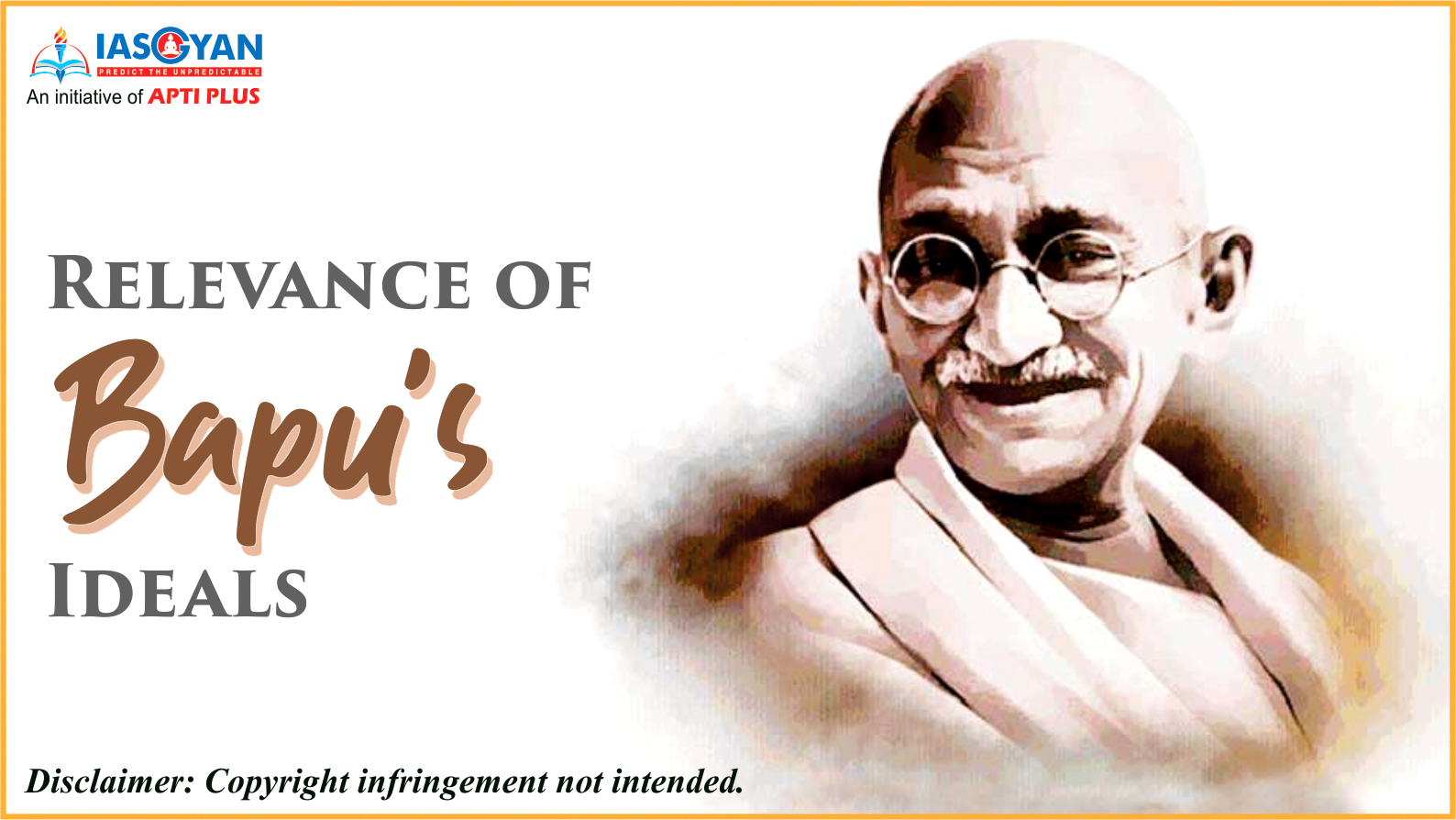RELEVANCE OF BAPU’S IDEALS

Introduction
- 30th January or Martyrs’ Day marks the assassination of Gandhiji in 1948.
- The day serves as a reminder to us of the leadership of Mahatma Gandhi - India’s apostle of peace.
- Gandhiji stands tall as a guiding light of truth, non-violence, humanity and compassion in the firmament of the greatest world leaders of all time.
The core ideals of Gandhiji

Ahimsa (Non-violence)
- Mahatma Gandhi’s name will always be synonymous with non-violence, so much so that the term “non-violence” is mentioned as “Gandhian”.
- Gandhiji’s principle of Ahimsa was based on the idea of non-violence and compassion.
- In the face of colonial violence, he proposed responding with non-violence.
- To his mind, a calm, nonviolent response lowers the anger and frustration of the aggressor.
- In his various campaigns Gandhiji practiced nonviolence as a means to bring about political and social change.
1.png)
Satya (Truth)
- As per S. E. Jone’s, “Gandhi, Portrayal of a Friend”; Gandhiji held the truth as God, and felt it to be integral to Satyagraha.
- Describing Satya, he once said,
The world rests upon the bedrock of truth;
untruth also means “nonexistent”
Its victory is out of the question. And truth can never be destroyed. This is the doctrine of Satyagraha in a nutshell.
- Devotion to this Truth is the sole justification for our existence. All our activities should be centered in Truth. Truth should be the very breath of our life.

Brahmacharya (Self Discipline)
- In one of his letters Gandhiji says,
“He who attempts to control only one organ, and allows all the others free play is bound to find his effort futile.”

Asteya (Non Stealing)
- Asteya is not just restricted to not stealing from others but as a concept based on our needs.
- As per Bapu, humans are not always knowledgeable of their needs, and hence end up multiplying our wants and thus, make ourselves “thieves.”
1.png)
Aparigraha (Non-possession)
- At the basic level, non-possession means desisting from hoarding of goods.
- Hoarding of goods and commodities deprive the poor of their basic needs.
- Secondly, aparigraha connotes reducing one’s needs and wants beyond bare minimum.
- As the lesser one wants, the better off one is, because he then is content with whatever he has with him.
- The ultimate stage of non-possession is no possession.
- In this state, there are no material possessions which lead to cultivating detachment.
- This attitude and way of life paves the way for spiritual liberation which is the ultimate goal of a human’s life.
Sharirshrama (Physical Labour)
- Bapu, wrote in Young India, in November 1925,
“Earn thy bread by the sweat of the brow- says Bible.”
- Man can be saved from injuring society, as well as himself, only if he sustains his physical existence by physical labour.
- Able-bodied adults should do all their personal work themselves, and should not be served by others, except for proper reasons.

Aswada (Control of the Palate)
- Besides a healthy mind, the leader was also very particular about abstaining from gluttony.
- Eating is necessary only for sustaining the body and keeping it a fit instrument for service, and must never be practiced for self-indulgence.
- Food must therefore be taken, like medicine, under proper restraint. In pursuance of this principle one must eschew exciting foods.
- Meat, liquor, tobacco, bhang etc. should be excluded. This principle requires abstinence from feasts or dinners which has pleasure as their object.
Sarvatra Bhayavarjana (Fearlessness)
- One cannot follow Truth or Love so long as one is subject to fear.
- He spoke of Fearlessness as thus in November 1946,
“Fear does not mean arrogance and aggressiveness. That in itself is a sign of fear. Fearlessness presupposes calmness and peace of mind. For that it is necessary to have a living faith in God.”
Sarva Dharma Samantva (Equality of the religions)
- Gandhiji stood for equality of the religions. His views have had profound influence on the Indian psyche and also reflect in the Fundamental Rights of the Indian Constitution.
- He said “For I believe in the fundamental truth of all great religions of the world”
Swadeshi (Use Locally Made Goods)
- Man serves the world best by first serving his neighbour. This is Swadeshi.
- Following this principle, one must as far as possible purchase one's requirements locally.
- One should not buy things imported from foreign lands, which can easily be manufactured in the country.
- There is no place for self interest in Swadeshi.
- Swadeshi enjoins the sacrifice of oneself for the family, of the family for the village, of the village for the country, and of the country for humanity.
Asprishyatanivarana – Removal of Untouchability
- According to Gandhiji, Untouchability, which had taken such deep root in Hinduism, is altogether irreligious.
- Its removal has therefore been treated as an independent principle.
Tolerance
- According to Gandhiji, the golden rule of conduct is “Mutual Toleration.”
- We need to acknowledge that we will never all think alike and we shall see Truth in fragment and from different angles of vision.
- Conscience is not the same thing for all.
.png)
- Therefore, it is a good guide for individual conduct. But imposition of that conduct upon all will be an insufferable interference with everybody's freedom of conscience.
Sarvodaya
- Sarvodaya means “the welfare of all.”
- The term was first coined by Mohandas Gandhi as the title of his 1908 translation of John Ruskin's tract on political economy, "Unto This Last".
- Sarvodaya movement is the movement which aims at rural reconstruction and uplifting the people of rural India by peaceful and co-operative means.
- Sarvodaya stresses on coexistence and mutual love.
Trusteeship
- It is a socio-economic philosophy propounded by Mahatma Gandhi.
- It provides a means by which the wealthy people would be the trustees of trusts that looked after the welfare of the people in general.
2.png)
Ram Rajya
- ‘Ram Rajya’ envisages a society in which virtue, morality and justice are the core ideals around which day-to-day interactions between citizen and citizen and; state and citizen occur.
- Gandhi said that for him a true Ram Rajya would ensure “equal rights to both prince and pauper”.
Gramaraj
- Gandhiji wanted to see each village:
- a little republic,
- self-sufficient in its vital wants,
- organically and non-hierarchically linked with the larger spatial bodies and
- enjoying the maximum freedom of deciding the affairs of the locality.
- Gandhi wanted political power to be distributed among the villages in India. Gandhi preferred the term ‘Swaraj’ to describe what he called true democracy.

Satyagraha
- Satyagraha or holding firmly to truth, or truth force, is a particular form of nonviolent resistance or civil resistance. Someone who practices satyagraha is a satyagrahi.
- The term satyagraha was coined and developed by Mahatma Gandhi.
- Satyagraha means the exercise of the purest soul-force against all injustice, oppression and exploitation.
- He deployed satyagraha in the Indian independence movement and also during his earlier struggles in South Africa for Indian rights.
Cleanliness
- Mahatma Gandhi believed that a strong country could only be built on the shoulders of cleanliness.
- Gandhiji termed cleanliness next to only godliness and rightly so.
Gandhiji’s Influence
- Gandhiji’s ideals inspired great men across the world, including Martin Luther King Jr. and Nelson Mandela.
- Gandhiji also served as an inspiration to Albert Einstein, Barack Obama, Pearl Buck and Steve Jobs, among others.
- Bapu successfully weaponised truth, satyagraha and peace in his helmsmanship of India’s struggle for independence, marked by tidal waves of peaceful protests.
- But the persistent question is
“How far are these ideas of nonviolence and truth that won us our liberty, relevant in today’s day and age?”
Let’s find out…
Relevance of Gandhiji’s values in 21st century
Some of the Gandhian principles hold universal relevance.
Need for Tolerance and Peace
- Each year, over 1.6 million people worldwide lose their lives to violence.
- Violence is among the leading causes of death for people worldwide.
- It accounts for 14% of deaths among males and 7% of deaths among females - WHO’s World report on violence and health.
- Violence ranges from physical, sexual, reproductive to mental health problems.
- Millions of lives are lost every year amid conflict zones. Example- Yemen and Afghanistan.
- Violence places a massive burden on national economies, costing countries billions of dollars each year in health care, law enforcement and lost productivity.
- In world that is moving through the phases of war marred by violence and naked dance of death of common people due to the menace of terrorism there is a significant requirement of Gandhian idea of Non- violence more and more today than the past days.
Sarvodaya
- According to the recent WEF’S “Global Social Mobility Report 2020: Equality, Opportunity and a New Economic Imperative” Report: Indians born in low-income family would take seven generations to even approach the country’s mean income.
- Some 220 million Indians sustained on an expenditure level of less than Rs 32 / day — the poverty line for rural India — going by the last headcount of the poor in India in 2013.
- It is necessary that each individual renders back unto society what he/she, owes to society.
- Gandhiji's political order of Sarvodaya encompassing Swaraj, Panchayat Raj, Decentralization and more importantly a non-violent statehood will be the basis for the solution to ailing communities all over the world.
Self reliance (Swadeshi)
- Globalization and consumerism have in fact made people’s lives tougher.
- The gulf between the rich and poor is widening day by day.
- Gandhian principle of self-sustenance and serving others is a significant requirement in present times as ever.
- This can be reflected in the “Atmanirbhar Bharat Abhiyaan” started by the Government.

Sustainable Environment
- Gandhji’s environmental concerns were real and are taking shape in the present times. Gandhiji had said “Earth has enough for Human needs, But not for Human greeds”
- He was quite apprehensive of machinery production and industrialization, which will harm the environment.
- And here we are, living a deplorable life among the noxious fumes, polluted, and harmful gases released by these industries.
- We cut trees and harm the forest habitat, which harms the ecological balance.
- The world is whirling under the burden of global warming, climate change and resource crunch.
- The world, including the United Nation has recognized Gandhian idea of sustainable development.
- The recent inauguration of Gandhi Solar Park at the headquarters United Nations (UN) is a testimony to that.
- Behind all the climate deals, environmental conservation treaties and sustainable development goals of the UN Gandhian view self sustenance operates as driving philosophy.
- The need for sustainable development is quintessential in present times.
Secular Ideologies
- The secular ideologies of Gandhiji are not only there in Indian constitution but also there in Indian society as a core value system.
- That is why so many people of diverse religions coexist in India.
- Today, the world today needs more and more tolerant people in societies where violence is committed in the name of religion.
- Tolerance in the society will help in neutralizing the ethnocentric bias in the globe that is taking place day by day on the basis of religion, caste, ethnicity and region etc.
Democratic Decentralization:
- Gandhi made it very dear that concentration of either economic or political power would violate all the essential principles of participatory democracy.
- To check centralization, Gandhi suggested the institution of village republics both as institutions of parallel polities and as units of economic autonomy. Village is the lowest unit of a decentralized system.
- Gandhian idea of decentralization of power is being implemented in democracies through empowered local self governments at grass root level.
- Indian government, for instance, have implemented local self government by adopting to Panchayati Raj and Municipality system in rural and urban areas respectively.
Casteless society
- Gandhi was against the caste system which is still a taboo in India.
- Even after 72 years of Independence and despite having reservations Indian society is grappling with casteism, communalism, regionalism and provincialism.
- Gandhiji wanted to eradicate untouchability and casteism from root and cause through the change in hearts of people.
- Thus, the Gandhian philosophy is useful create a casteless society where everyone is treated equally irrespective of their caste.
.png)
.png)
Trusteeship
- While India is one of the fastest growing economies in the world, it is also one of the most unequal countries. The top 10% of the Indian population holds 77% of the total national wealth—Oxfam Report.
- The Mahatma had suggested trusteeship as a concept where a certain part of an individual’s wealth was held in trust for the greater good of society.
- Today, the concept of trusteeship, can work as antidote to potential deviations from public interest.
The ethics of Truth, Non-stealing and Non-possession
- According to the recent “Global Corruption Barometer – Asia” Report by Transparency International (TI), India has the highest overall bribery rate (39%) and the highest rate of citizens using personal connections (46%).
- The country is riddled with the politician-bureaucrat-business nexus of corruption.
- Ethical approach of people in authority and transparency in service dispensation in institutions like education, law and order, judiciary and transport sectors, are imperative to curb this menace.
- And the answer lies in Gandhiji’s Philosophy of Truth and Morality that alone can rehabilitate India’s Moral Crisis.
Sanitation and Cleanliness
- Clean surroundings are a must for humans to exist as such an environment holds the promise of safeguarding our health to quite a degree against a plethora of often fatal diseases.
- It also helps in curbing mortality rates.
- The health of future generations depends on these factors.
- The Mahatma rightly said: "Sanitation is more important than independence".
- India has ranked a poor 168th out of 180 countries in the 2020 Environmental Performance Index (EPI), according to researchers at Yale and Columbia universities.
- Gandhiji had said, “Everyone must be his own scavenger,” but modern-day India is anything but that.
- We have let the sanitation of the nation go to the gutter and sent the poorest of the poor to go clean it up, letting them die in the process.
- Hence, it is more important today than ever to imbibe the values upheld by the Father of the Nation when it comes to cleanliness.
- The government’s Swachh Bharat Mission is a welcome move in this context.
- “So long as you do not take the broom and the bucket in your hands, you cannot make your towns and cities clean,” Mahatma Gandhi famously said and his words are true even today.
- No matter how much money is allocated to the cleaning up of the country, it is only when the individual citizen will take this herculean task in his hands that we would be able to eliminate the ghoul of dirt from our lives.
- If we feel ashamed in cleaning the very filth we create, despite having modern methods of disposing of waste, then we have knowingly pushed the nation into a septic tank of apathy which will consume us all.
- Swachh Bharat Abhiyaan needs the Gandhian push if the nation has to become a cleaner and more disciplined one.

Conclusion
- Gandhian ideologies have become the lighthouse for Indian policy makers over the years.
- Starting from poverty alleviation to Sarva Shiksha Abhiyan and universal health care (Ayushman Bharat) to skill India programs everywhere the core inspiration comes from Gandhianism.
- National food security act of India to Obama Care policy of the United States of America Gandhian concept of socialism holds the key as a guiding principle.
- For each one of us, Gandhian principles of swadeshi, swachhata and sarvodaya should be our guidelines.
- Rather than indulging in a globalised lifestyle, we should endeavour to respond to Gandhiji’s call for putting into practice a unique variant of “glocalisation”.
- Glocalisation means - learning to experience the entire world within the precincts of our immediate village or neighbourhood.
- This is in line with the Upanishadic dictum “viswam prushtam grame asmin anaathuram.”
- We should live in harmony with our environment, eschewing exploitative practices as far as possible.
- Every individual should follow the key Gandhian ideologies in their day to day life for a happy, prosperous, healthy, harmonious and sustainable future.






1.png)


1.png)

.png)
2.png)


.png)
.png)